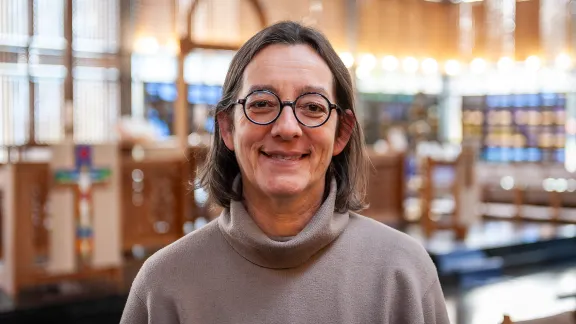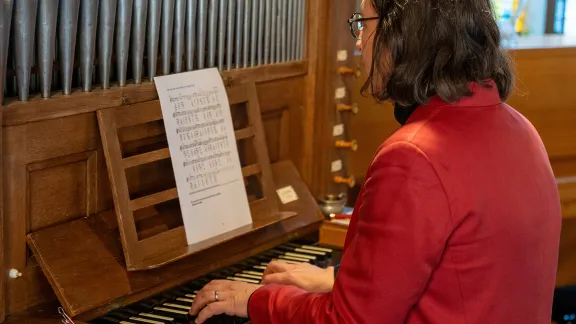A pianist since the age of 12, who went on to become the first woman president of a French Protestant church, Rev. Emmanuelle Seyboldt reflects on leadership and “the Bible at the center of my life.”

Rev. Emmanuelle Seyboldt, President, United Protestant Church of France. Photo: LWF/S. Gallay
Voices from the Communion: Rev. Emmanuelle Seyboldt, President, United Protestant Church of France
(LWI) – A pianist in the church since the age of 12, a Reformed pastor, who went on to become the first woman president of the United Protestant Church of France, Rev. Emmanuelle Seyboldt reflects on choosing “to put the Bible at the center of my life and share it with others.”
Speaking from a context marked by secularization and individualism, she highlights the importance of unity in diversity in a church that is both Lutheran and Reformed “and the ongoing need to create “space for real dialogue” to realize equality between men and women.
Can you tell us a little about yourself?
At the age of seven, I knew I wanted to become a pastor. The question about God was the most important subject in my life, and I wanted to dedicate my life to that. We went to church as a family in the Reformed Church of France (Église réformée de France) in Saint-Etienne. This is where I encountered the gospel, an encounter that gave meaning to my life. I chose to put the Bible at the center of my life and share it with others.
I asked to be baptized at the age of 15. Next year, I'll celebrate 30 years in the ordained ministry.
Music has played a big part in my journey in the church. Having learned to play the piano as a child, I've been providing musical accompaniment at church services since the age of 12, and still do so with great pleasure when I'm not presiding over the service! For me, song and music are particularly effective in expressing faith beyond words. It is a great vehicle for community life and commitment.
When did your journey of service in ministry begin?
I studied theology from 1989 to 1994 at the Protestant Faculty of Theology (Institut Protestant de Théologie) in Paris and Montpellier. At the age of 24, I was ordained as a pastor in the Reformed Church of France and served in the village of Saint-Laurent-du-Pape in Ardèche. Later, I worked as a pastor in Châtellerault in western France, and as a hospital chaplain in Poitiers.
Tell us about taking on additional responsibilities?
While I was a pastor at the Besançon Reformed parish in 2013, I was elected board president of the church’s Eastern Region, the same year the Evangelical Lutheran Church of France (Eglise évangélique luthérienne de France) and the Reformed Church of France joined forces to become the United Protestant Church of France (EPUdF). In 2017, I was elected President of the EPUdF National Council.
In 2023, the EPUdF celebrated its tenth anniversary. Please share some reflections?
There is a joke among Lutheran and Reformed pastors: “You can tell a Reformed by the fact that after three words he or she says ‘justice’, and a Lutheran ‘Jesus Christ.’” Even as a joke, it speaks volumes about the complementary contributions of the two denominations. For ten years now, within the United Protestant Church, Lutherans and Reformed have been getting to know each other and enriching each other's traditions, but there is still much to learn from each other.
What’s the significance of this union for you?
For me, it's the culmination of a happy journey [the reunification process started in 2007]. In fact, when the Leuenberg Agreement was signed in 1973, Lutheran and Reformed churches [in Europe] recognized that essentially, nothing separated them. And so, for over 50 years, the Reformed and the Lutheran church in France worked together. The pastors were trained at the same theological institute where I studied. Sometimes they even moved from one church to the other. But there was still a step to be taken to strongly manifest the agreement within the Leuenberg Concord, by becoming a single church, which was finally done in 2013.
I am very happy that we were able to make this union to be more coherent in what we believe and more relevant in proclaiming the gospel. When we are divided, our witness to the gospel is not credible.
You are the first woman President of EPUdF, could you tell us about being in this role?
When I was elected in 2017, the reactions in the media were astonishing. This election had a great impact on French society: a church presided over by a woman, that was extraordinary! (France is historically Catholic.)
But in fact, this was the natural thing to do, since women have been pastors in my church since 1966. So, the fact that 50 years later the first woman was elected president was quite normal. But even so, church members were very proud that their church was the first in France to have a woman president, and I think many were encouraged. Many women pastors in the EPUdF and other churches have been encouraged in their ministry.
You mentioned masculinity in your context as a church leader, can you elaborate?
It's a difficult subject, especially when it comes to meetings between church leaders. In fact, it's quite difficult to be the only woman in an all-male meeting. Because, in the end, that is when you realize that a woman's voice is not listened to in the same way as a man's. And that is very hard to accept. And it is something that men are completely unaware of. They don't realize that they're looking at me in an inferior way, and not as equals. But I don't let them! These are things that should never happen. We need to create space for real dialogue on the road to true equality between men and women in positions of responsibility.
When you look at the church in your context, what are the challenges and signs of hope?
The great challenge is not only secularization, but also individualism in society. Today, each person creates his or her own spiritual or religious path, with extremely diverse demands on churches. Churches need to learn how to welcome these people and enable them to discover the gospel, the history of the church.
We have set up witness training programs because French Protestants, with a long history of persecution, have always kept a low profile, in the shadows, and have learned to keep quiet in order to live their faith without being bothered. Today, they must learn to speak out to proclaim the gospel.
In a second program that began three years ago, parishes are visiting churches outside France that have discovered other ways of living and witnessing. This is not to copy them, but to observe the way they think and ask questions.
In addition, during the summer holidays, we organize a theology camp for young adults. It is bearing fruit as a number of young people go on to enroll in theology faculties and consider becoming pastors. But we still have a long way to go.
You recently attended RONEL, the annual LWF retreat for newly elected leaders, what struck you about the contexts of LWF member churches?
What really touched me was that in extremely different church situations, in very different countries, with very different economic and political situations, human beings are the same, and church leaders come up against similar difficulties. Power struggles, the risk of division, insurmountable theological divides, the place of women, training church members, accompanying young people. The challenges are the same, whether the church is rich or poor, small or big. And, as pastors in responsibility, we all need to work on the notion of service, otherwise we quickly lose sight of the fact that we have been called to serve Christ in his church, and there are great risks of drifting.
What does it mean for your church to belong to the LWF?
It means living the universal church in a very concrete way. In the LWF, we rub shoulders with brothers and sisters from all over the world. We know intellectually what the universal church is, but here we live it very concretely, and that's a great encouragement and support in our ministry and proclamation of the gospel.

At the piano, Rev. Emmanuelle Seyboldt accompanies morning worship during LWF’s November 2023 RONEL at the Bossey Ecumenical Institute Chapel. Photo: LWF/S. Gallay


